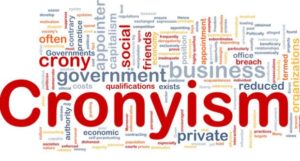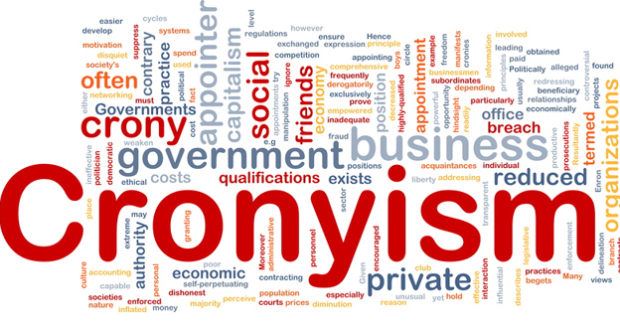
Allegedly free market Texas – is currently in the cronyism-enhancing process of outlawing competition in electricity transmission.
Cronyism: Why Are Republicans in Texas Sponsoring a Bill to Block Competition?:
“Legalese-to-English translation: Any company that wants to provide service – must first play Mother May I with the government.
“And this is not just a routine permit process request. The company must meet some amorphously awful definition of ‘public convenience and necessity.’
“Which means the government has any one of a million obtuse outs – to deny permission to any company it wishes.
“To my highly cynical eye and mind – this looks very much like an incumbent protection bill.
“Designed to allow government to block any and all newcomers – to shield the existing providers from the additional competition.”
Cronyism is, of course, anti-free market. It is anti-capitalism. Because it is government-sponsored anti-competition.
Well, the following seems to me to be…a little unusual. And extraordinarily good.
The United States Department of Justice (DoJ) – has an Antitrust Division. And within the Antitrust Division – exists the Competition Policy and Advocacy Section.
The Acting Chief of said Section – is Daniel E. Haar. And Chief Haar – isn’t a huge fan of Texas’ attempted cronyism.
How do we know this? Because Chief Haar put quill to parchment – and sent Texas state Representative Travis Clardy a letter.
Representative Clardy received the missive – because he had asked the Trump DoJ to weigh in on Texas’ attempted cronyism.
DoJ Chief Haar – is not happy:
“The Antitrust Division of the U.S. Department of Justice (the ‘Division’) appreciates your invitation to comment on Texas House Bill 3995 (‘H.B. 3995’ or ‘the Bill’).
“The Bill would amend Texas law to restrict which entities are permitted to develop facilities for the transmission of electricity in Texas. The Division is concerned that these restrictions would limit competition, thereby potentially raising prices and lowering the quality of service for electricity consumers.
“Competition is a core organizing principle of the American economy, and vigorous competition among sellers in an open marketplace gives consumers the benefits of lower prices, higher quality goods and services, increased access to goods and services, and greater innovation….
“Over the years, the Division has developed considerable expertise in examining wholesale electricity markets. For instance, this industry has been the subject of the Division’s antitrust enforcement efforts.
“In the Division’s experience, competition in wholesale electricity markets and in the development of transmission facilities—including competition from independent, transmission-only companies—produces important benefits for wholesale and retail electricity consumers.
“Additionally, as part of the Division’s competition advocacy mission, the Division has evaluated the effects of government regulations on competition in wholesale electricity markets and transmission development and has publicly advocated for market reforms because of the expected benefits of competition for consumers….
“H.B. 3995 would amend Texas law to restrict which entities are permitted to develop facilities for the transmission of electricity in Texas. In particular, the Bill would restrict construction by entities that do not directly interconnect with the new facilities.
“The Bill also may limit what type of entity may obtain a required state certificate of convenience and necessity (‘CCN’) to construct or extend transmission facilities in Texas. These provisions would prevent non-local utilities and independent transmission-only companies from competing to construct new transmission facilities.
“We understand that this is a shift from current practice in Texas….
“The Division urges Texas to consider whether H.B. 3995 may harm competition and consumers in ways that resemble the harm that can be caused by ROFR laws found in other states.
“In particular, by restricting the development of transmission facilities to local incumbents, H.B. 3995 can harm consumers by reducing or eliminating competition.
“For example, even if a non- local utility or a transmission-only company was more efficient and could develop higher quality transmission facilities at a lower cost, H.B. 3995 could deny that firm the opportunity to construct that project and likewise deny consumers the benefits of the new competitor’s efforts.
“Consequently, such entities also would not have the incentive to look for and propose such beneficial projects.
“Even if an incumbent is best-situated to develop a particular project, H.B. 3995 would likely reduce the competitive pressure on such incumbents to develop higher quality, lower cost transmission facilities.
“Thus, as a result of lost competition, consumers may have higher expenses in the form of greater transmission rates. Furthermore, consumers may face higher electricity rates and less reliable service as H.B. 3995 may limit construction of transmission that would increase the supply of generation available to serve a local territory or area….
“We appreciate the opportunity to present our views.”
In the 1997 flick “As Good as It Gets,” Jack Nicholson’s character simply unloads on Greg Kinnear’s character for knocking on Nicholson’s door.
Nicholson rips off an extended, detailed and highly personal exposition directed at Kinnear – angrily explaining why Kinnear should never again, under any circumstances, knock on Nicholson’s door.
Asked if he understands – a stunned and completely floored Kinnear glumly, quietly responds:
“Yes. It’s not a subtle point that you’re making.”
It is not a subtle point Competition Policy and Advocacy Section Chief Haar is making.
Haar details the very many reasons competition is good – and Texas’ anti-competition bill is bad.
Here’s hoping Haar’s incisive clarity – wins the day in the Lone Star State.
This first appeared in Red State.

